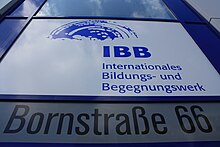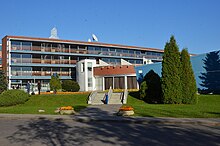International educational and meeting organization
The international educational and meeting organization e. V. and the international educational and meeting organization g. GmbH are based in Dortmund (IBB Dortmund) and have a representative office in Berlin. The IBB Dortmund is involved in the international educational and meeting center "Johannes Rau" Minsk and initiator of the history workshop "Leonid Levin" in Minsk. The IBB also runs the Chernobyl history workshop in Kharkiv, Ukraine.
The international educational and meeting organization e. V. is a recognized institution for general further education and political education in North Rhine-Westphalia and a recognized provider of child and youth welfare . The association was founded in 1986 by activists of the peace movement. In 2016, around 100 people worked full-time at the IBB locations. They are supported by the IBB members and curators.
aims
As part of the ecumenical peace movement, the International Association for Education and Encounters works for international understanding, reconciliation and tolerance. The work of the IBB is financially and ideally supported by churches and foundations in the state of North Rhine-Westphalia, the federal government and various programs of the European Union . The international educational and meeting organization has a Europe-wide network of partner organizations with whom it cooperates in various project contexts.
History and facilities
When the association was founded in 1986, images of the enemy and the fear of a military escalation between East and West determined life in Europe. In the environment of the peace and environmental movement, the desire for counter-concepts grew. The IBB's educational and meeting projects across the “ Iron Curtain ” gave rise to the idea of an international training and meeting center, which was built in Minsk in the early 1990s and has since been a place of reconciliation, exchange, dialogue and, in particular, practical cooperation between Eastern and Western Europe is.
In 2003 the Minsk History Workshop was created as a joint project of the IBB Dortmund, the IBB Minsk and the Association of Jewish Communities in Belarus . It is a meeting point for survivors of the Holocaust and the dialogue between contemporary witnesses and young people.
In 2012 the Chernobyl history workshop in Charkiv was set up in cooperation with the “German-Ukrainian Network” and the Association of Liquidators in Charkiv. In Kharkiv 30,000 of the 850,000 liquidators, firefighters, pilots, road workers, cooks and in other professions as soldiers than about living first responders at the reactor of Chernobyl were in use. The history workshop keeps the memory of the far-reaching consequences of the Chernobyl nuclear disaster alive and serves as a meeting point for the liquidators.
Milestones in IBB history:
- In 1990 the foundation stone was laid for the IBB Minsk in the presence of 400 participants from Germany and many guests from Belarus. In 1994 the IBB Minsk opened.
- IBB Dortmund has been in charge of the Belarus funding program since 2002.
- In 2003 the Minsk History Workshop started its work.
- In 2008, with the support of Stiftung Mercator, the IBB launched ewoca³, the funding program for youth facilities in North Rhine-Westphalia, for the first time.
- For its contemporary witness project at schools "20 Years of German Unity", the IBB received the 2011 "Unity Prize 2011 - Citizens' Prize for German Unity".
The IBB eV has been organizing and accompanying school trips to "search for traces of National Socialism" since it was founded. Since 2015 the IBB gGmbH has been recognized by the Federal Ministry for Family, Seniors, Women and Youth as the central agency for memorial tours.
The memory of the Chernobyl reactor disaster and, since 2012, the memory of the Fukushima reactor disaster also occupy a large space.
In addition, the IBB regularly offers intercultural training for full-time and voluntary employees in refugee aid and social professions.
Priorities and programs
The IBB Dortmund concentrates on the key areas of “remembering”, “social society”, “sustainability” and “experiencing Europe”.
The focus on remembering includes offers to search for traces of National Socialism, the promotion of trips to memorial sites in Poland, the work of the history workshop "Leonid Levin" Minsk and the history workshop Charkiw, the initiative for a worthy Trostenets memorial and projects for common remembrance. The aim is to learn from history for a common future in Europe.
The European action weeks "For a future after Chernobyl and Fukushima", the support program Belarus and ewoca³ and ewoca³ (+), the support programs for youth organizations, are part of the sustainability focus.
The focus on social society includes advanced training in dialogue with Turkey, advanced training on culturally sensitive work, work in the network Includ: Wed and specialist excursions. The Chernobyl history workshop and the Belarus funding program also focus on social society.
Experiencing Europe includes seminars and trips for professional and general further education as well as political education.
The IBB e. V. and the IBB gGmH more than 1000 events per year such as eyewitness talks, study trips, intercultural encounters, training courses, international conferences, workshops and work camps. Almost all programs are carried out in cooperation with partners.
sustainability
In its seminars and funding programs, the IBB Dortmund supports the principles of education for sustainable development and is committed to the energy transition in Europe.
Publications
- Overcoming borders - image brochure of the International Association for Education and Exchange Dortmund (IBB Dortmund)
- Belarus Perspektiven - magazine (appears 4 times a year)
- European perspectives, commemoration for a common European future, documentation of a commemorative trip to Trostenez in May 2015, IBB Dortmund, 2015
- 20 years IBB "Johannes Rau" Minsk - Anniversary brochure 2014
- Experiencing experiences - illustrated book about the work of the Belarusian artist and architect Leonid Lewin, IBB Dortmund, 2010
- History workshop Minsk, a historical project in an authentic place, IBB Dortmund, 2013
- The city of Minsk during the German occupation, Uwe Gartenschläger, publisher IBB Dortmund,
- Paul Kohl: The Trostenez extermination camp - eyewitness reports and documents
- Ljuba Abramowitsch, Hans-Heinrich Nolte: The void in Slonim
- “When words scream and cry” - diaries of Ljalja and Berta Bruk
- The extermination site of Trostenets in European memory - materials for the 2013 conference
- Lost places, broken biographies - illustrated book with photos by Rüdiger Lubricht, publisher IBB Dortmund, 2011
- Chernobyl and the European solidarity movement, IBB Dortmund, 2011
- Chernobyl: people, places. Solidarity, IBB Dortmund, 2011
- Conference documentation "Dialogue with Turkey"
- Study trips to memorial sites in Poland , Monika Junge-Wentrup, publisher IBB Dortmund, 2015
Web links
- Internet presence of the IBB
- Internet presence of IBB "Johannes Rau" Minsk
- Internet presence of the Minsk history workshop
- Website of the Chernobyl history workshop in Kharkiv
Individual evidence
- ↑ ibb.by. In: ibb-minsk.by. Retrieved January 30, 2017 .
- ^ Minsk History Workshop. In: gwminsk.com. Retrieved January 30, 2017 .
- ^ The Chernobyl History Workshop in Kharkiv. In: ibb.org.ua. Retrieved January 30, 2017 .
- ↑ unit price 2011. (pdf) Citizen Award for German Unity 2002 - 2011. In: bpb.de. Federal Agency for Civic Education, 2011, p. 23 , accessed on January 30, 2017 .
- ↑ Funding for trips to memorial sites. In: ibb-d.de. Retrieved January 30, 2017 .

